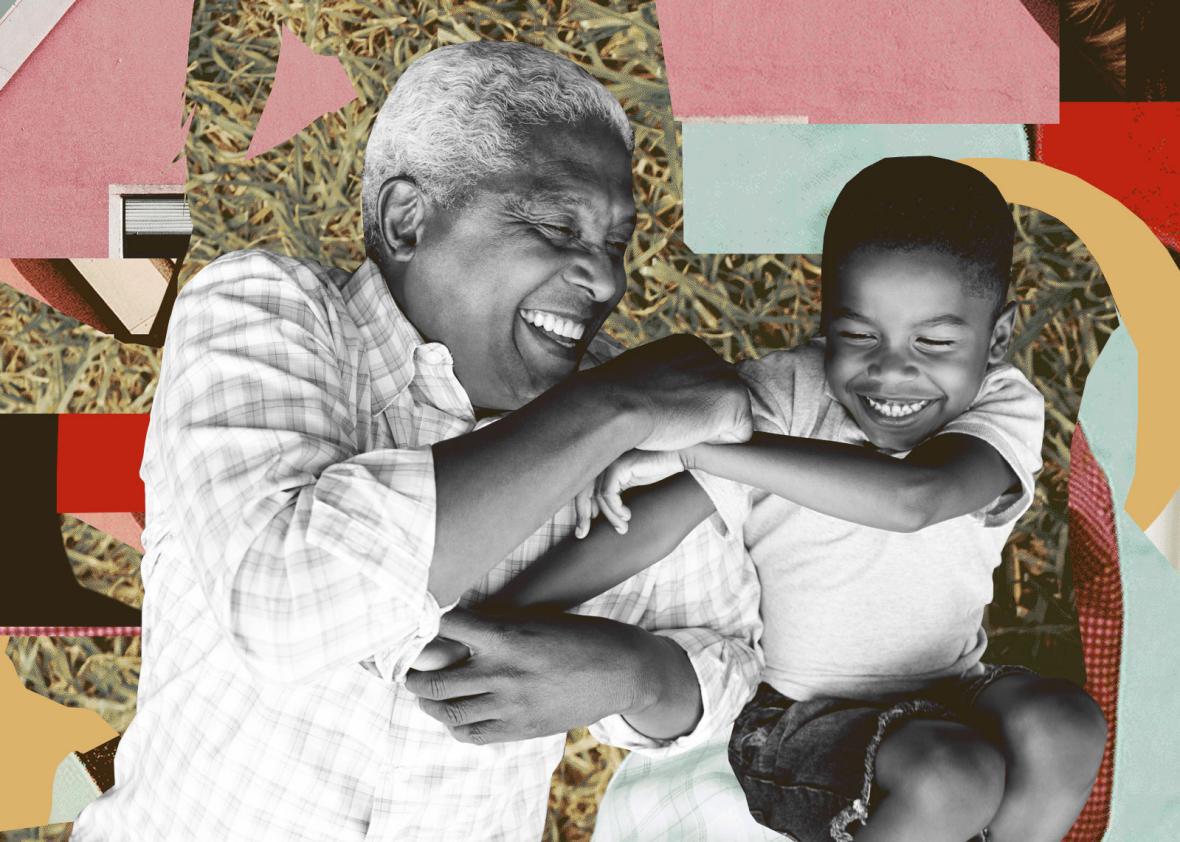Among my friends in the U.S. and abroad, I’ve been noticing a new trend: When a new baby joins the family, grandpas are increasingly reporting to duty. They may not know how to sterilize bottles or work the straps on a carrier, but they’re making a deliberate decision to be more involved with their grandchildren. They’re paying attention to domestic details that moms and grandmas may not have known they could discern. “I haven’t seen this truck yet. Is it new?” “This is not a onesie I noticed before.” “Can he really not have solid foods yet?”
Without a doubt, norms around male involvement in caregiving are changing. But except for a small study here and there, much of the great new research on masculinity and fatherhood revolves around the role of dads, with grandads’ voices rarely popping up. To take a closer look at what grandfathers have been thinking about childcare, we talked to three from different parts of the world: a grandpa in the U.S., a saba in Israel, and a dědeček in the Czech Republic, all of whom made a conscious choice to be a big part of their grandchildren’s lives.
“Back in the day, it was just assumed that the mother would take on the majority of the parenting responsibilities,” says Michael Anthony, 68, a retired aerospace engineer in San Francisco. “I was at work all day, every day, and just didn’t think much about what I was missing and what my wife had to do. Looking back on it now and seeing more of how our grandchildren are taken care of, I realize I was really oblivious as a parent.” Now, he says he spends “many whole days” with his two small grandkids.
“I loved it when my kids were little, and I tried to do what I could,” says Jiří Dušek, 56, who lives in Prague and works as a head of the laser department at a Czech manufacturer. “But I think I owe my kids so much. To be honest, I don’t even remember if I was able to take any days off work when they were born.” Whatever time he wasn’t able to dedicate to his own children, he now tries to give to Hugo, his 7-year old grandson. “We’ve been taking ‘men-only’ trips since he was 2, and we spend several weeks on vacation together each year.” (Several weeks? Remember, this is Europe.) “We swim together, paint, he helps me fix things. Every Tuesday, my wife drops him off at my office and then we go to mountain biking practice. Then Hugo spends the night at our house, and I take him to school the next day.“
Zeev Cohen, 73, retired from Israeli public radio in Jerusalem. He took time off work when both of his two kids were born; he was in the delivery room with his wife, something that wasn’t the thing to do for his generation. Then he rushed home the same day to make all the arrangements, buying all the newborn clothes and fixing up the cot. He recalls feeding his kids when they were small. “Still, I wish I had had time to go with them to after-school activities, spend more time reading to them at home, or drawing with them. On a day-to-day basis, I probably missed things,” he says. He gets to catch up with his five grandkids: teaching them to draw, taking an active part in their soccer training, and joining one grandson for karate class.
All three agree that fathers becoming more involved in their kids’ lives hasn’t relieved as much pressure on their partners as one might hope. “For mothers, things are harder as they are having to multi-task, their careers have become more demanding, and they have to be superwomen,” Cohen says. “There are no fewer pressures of motherhood,” Anthony says, “even with fathers helping out more these days.”
Dušek points out that fathers tend to work much longer hours than those in his generation did. He says that he’s become more understanding toward colleagues who are parents—he doesn’t mind when they leave early to take their kids to swim practice. Parents make sure to catch up on this time and stay later on other days, he says.
All three also agree that young parents need greater government support and corporate flexibility. “The Israeli working world is not family-friendly enough,” Cohen says. “Dads should have a longer parental leave”—the Knesset approved a mere five-day paternity leave policy just last year—“and [employers should] shorten the working hours at least one or two days a week.”
To effect change, these grandpas might see results with a little peer pressure. Today’s granddads have a lot of concentrated power: In the U.S., for example, 63 percent of senators are over 60 years of age, and it can be safely presumed that many of the world’s gray-haired parliamentarians already have grandchildren. Sixty percent of American grandparents still have a part- or a full-time job. Over the past decade, the number of CEOs ages 65 to 69 nearly doubled among Fortune 500 companies, and those over 70 also increased. (Needless to add, over 95 percent of Fortune 500 CEOs are men.)
“The U.S. is way behind the curve when it comes to parental leave,” Anthony says. But if men of every generation continue to argue for their parental rights, in a few decades, teaching your grandkids to draw and noticing every new truck among the toys might not feel so bittersweet.
